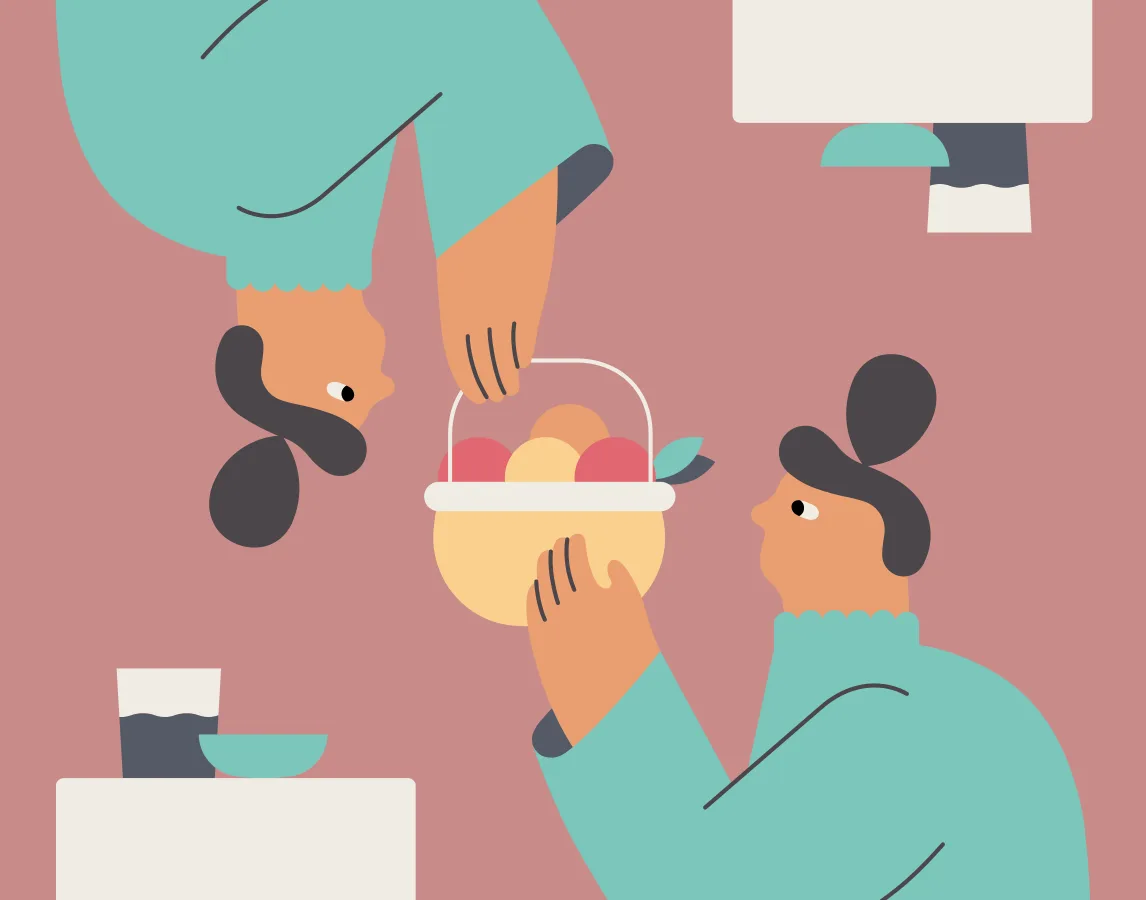What would make Future You happy?
Elisabeth Dahl
Jun 14, 2021
Yesterday I came home with a bag of peaches—the last good ones of the year, according to the woman who runs the farm stand. I laid them out on the counter in a triangle, like a rack of balls on a pool table. Then I faced a decision: greedily eat all the peaches over the next few days, or eat a few now and store the rest in the freezer for later. Instant gratification or delayed bliss?
The wise choice was to wait. As great as ripe summer peaches are the first time around, they’re even better midwinter. Pull some out of the freezer in January, when the oaks are leafless, the ground impenetrable and the cars crusted with road salt, and you have not just a stone fruit but a time-travel device. It’ll be summer all over again, at least for a few minutes. Unfortunately, that meant not eating all the fruit right away—a reward postponed. Like you (probably), I was brought up to do things on time, in steps, without procrastinating. I dutifully attended middle school study skills classes, turned in my term paper outlines a month before the papers were due and so forth. It was true: life worked better when you didn’t put things off. But the self-talk related to maintaining these habits felt so negative. Some days, my mind was a dystopian world of “have to,” “don’t” and “should.”

"The idea was stupidly simple—a way to spin things differently and make the environment inside my head more pleasant."

As a middle-aged person, I was doing OK with self-control when it came to work and other deadline-driven tasks, but when it came to smaller, less time-sensitive issues (the shower that needed scrubbing, the tax form that needed filing), things weren’t going as well. And then one day, when I was passing the same clump of dog hair that had been sitting at the top of the stairs for three days, the one that really bugged me but I hadn’t dealt with yet, I remembered the phrase “pay it forward.” I guess I came to know this concept sometime in the 1990s, not long before the Kevin Spacey/Helen Hunt movie of the same name. It was a lovely idea, a way of giving back to the world: you received a gift or kindness of some type, and rather than simply paying it back to the source, you did a similar gesture for another person instead. But, standing on the staircase that day, feeling ticked off that I still hadn’t cleaned the step, I thought of the phrase a different way. What if the me of today could do things for the me of tomorrow? As minor a matter as the clump of dog hair was, how much would the me of tomorrow love to wake up to a clean step? It would be like paying it forward, except to myself. The idea was stupidly simple and yet it seemed appealing—a way to spin things differently and make the environment inside my head more pleasant. That day on the staircase, I headed for the Swiffer with increased enthusiasm. And sure enough, the next morning, the clean step was a bluebird of happiness instead of a filthy reminder of my lassitude.
This new approach to getting stuff done has been hugely helpful. It feels so much more positive, and therefore motivating. For tasks like cleaning the steps or mowing the lawn—things that have to be done regularly—it’s fine. (I mean, the grass does keep growing. You’ll be mowing again in a week’s time.) But for one-off tasks, like filing financial aid forms, it’s fantastic. I have a couple of days of grittiness—actually doing the thing—and then weeks and weeks of remembering, I have already done the thing! Some of the most important “paying it forward” you can do for yourself involves really long-term goals and outcomes. You’ll be a healthier 80-year-old if you spend less time sitting when you’re 40. On some of these big-picture matters, I’m still working. Flossing, for instance, has proven as resistant to this new “pay it forward” spin as it was to the “should” approach. But I hold out hope. Going back to the year’s last peaches, it took some discipline, but I got out a storage container, filled it with slices—yellow through the flesh, ruby near the pit—and slid it to the back of the freezer. I can’t wait for that distant day in winter when Future Me receives payment.


Be kind to your mind
- Access the full library of 500+ meditations on everything from stress, to resilience, to compassion
- Put your mind to bed with sleep sounds, music, and wind-down exercises
- Make mindfulness a part of your daily routine with tension-releasing workouts, relaxing yoga, Focus music playlists, and more
Annual - billed at $69.99 USD/yr
14 days free
$5.83 USD/month
Monthly
7 days free
$12.99 USD/month

Meditation and mindfulness for any mind, any mood, any goal

Stay in the loop
Be the first to get updates on our latest content, special offers, and new features.
By signing up, you’re agreeing to receive marketing emails from Headspace. You can unsubscribe at any time. For more details, check out our Privacy Policy.
- © 2025 Headspace Inc.
- Terms & conditions
- Privacy policy
- Consumer Health Data
- Your privacy choices
- CA Privacy Notice







